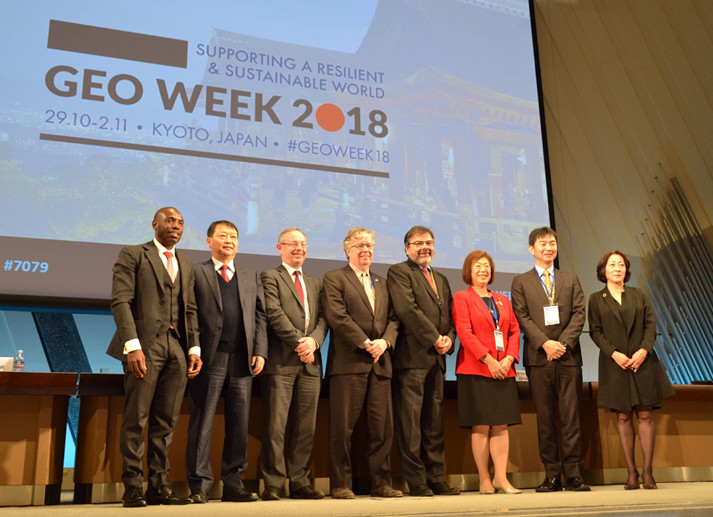GEO Week 2018 looks to the digital economy for Earth observation data and technology
News / 13 December 2018
The international Earth observations community must reduce barriers to access and use of planetary data if they want to achieve global environmental and sustainable development goals. This was a key message emerging from the Group on Earth Observations (GEO) annual gathering, held in Kyoto, Japan from 29 October - 2 November 2018.
Over 500 people came together for GEO Week 2018 to share their experiences on the use of Earth observations for the benefit of society. The week’s events focused on GEO’s three priority engagement areas: the Sendai Framework for Disaster Risk Reduction, the Paris Climate Agreement, and the United Nations 2030 Agenda for Sustainable Development.


South Africa stepped into the role of GEO Lead Co-Chair for the GEO-XV Plenary, a position previously held by the United States of America.
Looking toward the 2019 GEO Ministerial Summit in Canberra, Australia, Mr. Mmboneni Muofhe, Deputy Director General of South Africa’s Department of Science and Technology, said “As GEO moves towards its 5th Ministerial in 2019, it is important to emphasize the diversity and inclusivity of its vision through the active engagement of the Global South. GEO can only be effective if all regions are contributors to this vision, particularly the youth and entrepreneurs located in the Global South. We envisage a results-orientated GEOSS as an enabling platform to this end.”
On the transition, GEO Secretariat Director Gilberto Camara said “I welcome the opportunity for closer engagement with South Africa and the African GEO caucus over the coming year, in line with our focus on increasing the value of Earth observation activities and services for developing countries.”
The value of Earth observations and the challenges related to the their use for the achievement of the Sustainable Development Goals was a key focus of the event. During the Plenary, a diverse lineup of speakers and panelists called on the GEO community to urgently open and make use of Earth observation data and technologies, in order to address the fundamental challenge of our time: providing food, water, and energy for 9.4 billion people, while minimizing the impacts of climate change and protecting our planet’s biodiversity.
In support of this vision, a new joint initiative from GEO and Amazon Web Services (AWS) was announced. The GEO - Amazon Earth Observation Cloud Credits Programme will provide up to $100,000 of AWS cloud credits to eligible parties for projects that support environmental and development goals. AWS will provide cloud services to help host, process and analyse large geospatial data sets for non-commercial purposes, prioritizing projects that make use of open satellite data and align with the engagement priorities of GEO.
With the Paris Agreement as another central theme of the event, GEO Week 2018 host country Japan was applauded for the 29 October launch of the new Greenhouse gases Observing Satellite (GOSAT-2).
This satellite will provide more accurate measurements of atmospheric concentrations of major greenhouse gases, including carbon dioxide and methane. Mr Hiroshi Yamakawa, President of Japan Aerospace Exploration Agency (JAXA), told the Plenary that through a variety of open satellite data and integrated information products, JAXA is focusing on global environmental monitoring and technology sharing with developing countries.
Rounding out GEO Week thematic focus areas was Earth observations for disaster risk reduction.
Mami Mizutori, Special Representative of the Secretary General to the United Nations Office for Disaster Risk Reduction (UNISDR), said in her keynote address that more and more countries are working to establish national and local strategies for disaster risk reduction by 2020, in line with the Sendai Framework, and noted that “Earth observation data can greatly assist countries in assessing current risk trends with a view to determining the most pressing priorities that their disaster risk reduction strategies need to address.”
Ms. Mizutori also emphasised that Earth observation data is already essential to UNISDR’s effort to build a collaborative Global Risk Assessment Framework, which will “support countries and decision makers at all levels in assessing their systems-risk comprehensively and enable them to take informed decisions.”
GEO Week 2018 marked an important transition for GEO, as it solidifies its vision of a results-based GEO ahead of the 2019 Ministerial Summit, where Ministers from GEO’s 105 Member Countries are expected to come together from 4 - 9 November in Canberra, Australia to discuss global issues and accelerate delivery of GEO’s Strategic Plan.
---
Explore the GEO Week 2018 website for GEO-XV Plenary and side event session recordings, photos, documents, presentations, and official statements from Member Countries and Participating Organizations: bit.ly/GEOWEEK2018
Read the 2017-18 GEO Highlights Report here:
For more information please contact Maddie West at mwest@geosec.org